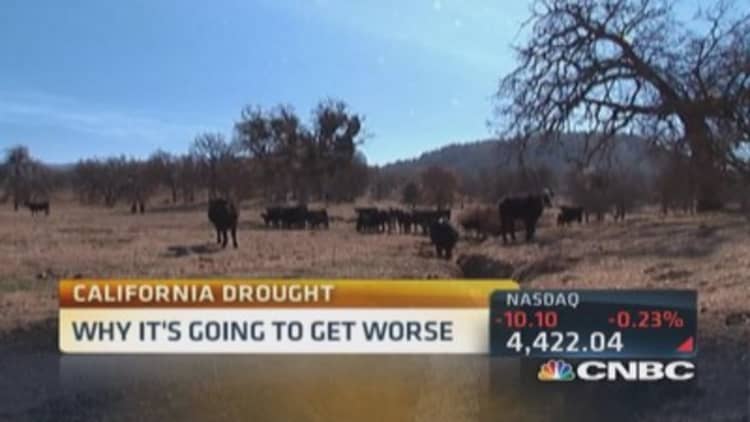In drought-stricken California, workers in industries from golf to medical marijuana are struggling to prevent the lack of water from drying up business. Most are cautiously watching the weather in hopes that fall and winter storms bring enough rain and snow to keep their doors open. But for some companies, the persistent lack of moisture has been too much: They've already been forced to close.
1. Organic dairies get creamed
"We sold out about five months ago," Tony Azevedo, owner of The Double T, a ranch in the heart of the San Joaquin Valley, told NBC News when asked about his organic dairy operation. "We went out of business."
Organic dairies, he explained, hinge on the ability to pasture-graze cows. This past winter, the lack of water prevented him from growing his usual lush green pasture for the third year in a row and he was unable to pay his bills.
More From NBC News:
Final Teen Captured After 13 Escaped From Nashville Detention Center
All in the Timing: When Will Democrats Try to Replace Eric Holder?
Wage Theft Costing Low-Income Workers Billions
The non-organic, or conventional, dairy business, by contrast, is strong because high milk prices allow those farmers to afford Azevedo's organic feed and still turn a profit. "It is kind of their turn," he said.
2. Golf courses lose turf
Other drought winners are tending — for now — wall-to-wall greens on golf courses sprouting from the desert in and around Palm Springs. Duffers and politicians there long ago recognized the paucity of natural moisture could be the golf industry's undoing and invested heavily in projects to store water imported from Northern California and the Colorado River.
"The reservoirs are still in reasonably good shape," Craig Kessler, director of governmental affairs for the Southern California Golf Association, told NBC News. "Although," he added, "conservation measures are going on at a very rapid clip … those reservoirs are in the process of being drawn down."
Read More California economy stands up to nature's wrath
Measures include computer-controlled irrigation systems that activate only when necessary and participation in programs to reduce the amount of green turf present on the course, creating a look that is "a little more rugged and rustic than we are used to."
3. Cutbacks at breweries

For now, parched golfers can quench their thirst with one of the hundreds of craft beers brewed in California. But less beer may be available if the dry conditions persist, according to Tom McCormick, the executive director of the California Craft Brewers Association.
"We certainly hope that it would not come to the point where brewers would have to reduce production," he told NBC News. "It is just hard to say and hard to predict at this point."
Many brewers in California have already been required to reduce their water consumption by 20 percent. So far, the reduction has been accomplished with more efficient cleaning and bottling processes, but further water restrictions could mean less beer, McCormick noted.
4. Sushi rice rolled short
Just about every roll of sushi rolled in America is rolled with California rice, according to Jim Morris, a spokesman for the California Rice Commission. "That is one area to watch," he told NBC News when asked how the rice industry is being impacted by the drought.
The commission estimates that rice acreage planted this year is down 25 percent, which is about 140,000 acres. The repercussions are not yet known but could ripple through rural communities in the Sacramento Valley where rice farming is a core business. The rice fields are also prime habitat for migrating birds, so the cutback in acreage might affect birds on the Pacific flyway, Morris noted.
Read More California rice farmer: Drought may make us 'quit'
On the bright side, he added, California farmers have grown rice for more than 100 years and survived past droughts. "We don't know fully how the future is going to play out," he said. "We are certainly hopeful for a wet fall and winter to kind of help restore the water supply situation."
5. 'Eternally optimistic' skiers eye El Niño

Ski area operators "tend to be eternally optimistic," Michael Berry, president of the National Ski Areas Association, told NBC News. "We are a weather-dependent industry. We have seen these patterns before in California – maybe not quite this severe, but similar in severity. So the real question for California is can they look forward to an average snowfall this year?"
The 2013-2014 ski season was the worst of three bad years in California. Skier visits were down nearly 30 percent, according to the association. Operators are keeping a close eye on the prospects for El Niño, which often brings big snowstorms to the Sierra Nevada.
Read More Why it's so hard to call the end of a drought
"There is pent-up demand," Berry noted, explaining that a decent snow year would bring out the masses. "It would take more than three years to dissuade people from skiing and snowboarding."
6. Marijuana growers run streams dry
Whether or not northern California's marijuana growers are feeling a financial pinch from the drought is uncertain given that most of the pot is grown in a shadow economy, according to Aaron Smith, the executive director or the National Cannabis Industry Association.
What is known is that more twice as much weed is grown today than in 2008, much of it with water diverted from streams to the detriment of endangered fish such as salmon, the California Department of Fish and Wildlife reported in July.
Read More 10 countries that may be hit hard by climate change
"This product needs to be regulated for a number of reasons. One of them would be to encourage much better water management and practices. You wouldn't have illegal operations diverting creeks," Smith told NBC News. "Under regulation," he added, "you would have licensed growers that would be incentivized to follow the law."

